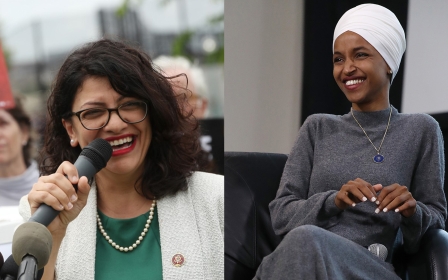'Members of Congress are not immune': Advocates slam Israeli ban on Tlaib and Omar

US Congress members must defend their colleagues Rashida Tlaib and Ilhan Omar, Palestine advocates in the United States say, as the Israeli government confirmed it plans to bar the congresswomen from entering the country.
Yousef Munayyer, executive director of the US Campaign for Palestinian Rights, said on Thursday that it will be critical for elected officials in the United States to condemn the Israeli government's actions.
"There's an exception on calling out racism and discrimination when it's practiced by Israel, even if it means that they're doing that now to American elected officials," Munayyer told MEE in a telephone interview before the ban was officially announced.
Israel confirmed on Thursday that it planned to bar Tlaib and Omar - who were slated to tour the West Bank, including East Jerusalem, starting this weekend - from entering the occupied Palestinian territories.
Tlaib and Omar - the first two Muslim women ever elected to Congress - have spoken out about Israel's human rights abuses against Palestinians, and they have publicly voiced their support for the Boycott, Divestment and Sanctions (BDS) movement for Palestinian rights.
Israeli leaders have cited their support for BDS to justify the country's ban on the US lawmakers.
"The itinerary of the two congresswomen reveals that the sole purpose of their visit is to harm Israel and increase incitement against it," Israeli Prime Minister Benjamin Netanyahu said in a statement.
'There's an exception on calling out racism and discrimination when it's practiced by Israel, even if it means that they're doing that now to American elected officials'
- Yousef Munayyer, US Campaign for Palestinian Rights
Munayyer highlighted the fact that dozens of members of Congress were able to visit Israel this month on a tour sponsored by the pro-Israel lobby group, the American Israel Public Affairs Committee (AIPAC).
US Congressman Steny Hoyer, the Democratic Party's majority leader, led the largest-ever Democratic delegation on the visit, during which he pledged to keep support for Israel a central plank in the party's platform and rejected accusations that Netanyahu was racist.
"Nobody was denied because they were participating in AIPAC's propaganda tour, seeing things from the perspective of the Israeli government," Munayyer said.
"Now their colleagues, because they didn't go along with the orthodoxy of Israel's propaganda, they are being treated differently and denied entry here because they are critical of Israel's policies."
When contacted for comment on Thursday, Hoyer's office directed MEE to a statement in which the Maryland congressman described Israel's decision to ban his Democratic colleagues as "outrageous, regardless of their itinerary or their views".
A Hoyer aide also said the lawmaker spoke directly to Netanyahu and Israel's ambassador to the US, Ron Dermer, in his efforts "to convince the Israeli government to allow Reps. Tlaib and Omar entry".
"He believes refusing them entry is a grave mistake that undermines the bipartisan pro-Israel consensus," the aide said in an email.
Pressure from Trump
The Israeli authorities have regularly barred American and other foreign citizens of Palestinian ancestry from entering the country, Munayyer said, and in that context, the idea that Israel would ban Omar and Tlaib is not surprising.
Still, Munayyer said that "what's new here is that even members of Congress are not immune from the discriminatory policies of the Israeli state".
The ban also comes after months in which President Donald Trump has publicly lambasted Tlaib, who is Palestinian-American, and Omar, who came to the US as a refugee from Somalia, for their support for Palestinian human rights.
On Thursday, the US president said the congresswomen "hate Israel & all Jewish people, & there is nothing that can be said or done to change their minds".
He said "it would show great weakness" for Israel to allow them into the country.
Both Tlaib and Omar have repeatedly denounced antisemitism, among other forms of racism.
In July, Omar - who in particular has faced the most vitriol from the president and his main supporters in Congress and elsewhere - said she believed Trump "is fascist".
"We have said this president is racist. We have condemned his racist remarks. I believe he is fascist," Omar told reporters at the time.
But that hasn't stopped Trump from seeking to make Israel a partisan issue in Washington, especially as more progressive members of the Democratic Party are openly voicing their opposition to Israel's continued occupation and rights abuses against Palestinians.
Several top Democratic 2020 presidential contenders have voiced concerns over Israel's policies, and most skipped the national AIPAC conference in the US capital earlier this year - something Palestinian advocates said signalled a shift within the party.
'To be clear, this is about nothing other than shutting down freedom of expression and policing political opinion; only the right kind of American, with the right kind of politics, can get in'
- Tareq Baconi, International Crisis Group's Israel/Palestine analyst
Tareq Baconi, an Israel/Palestine analyst with the International Crisis Group, said the decision to bar entry to Tlaib and Omar is being "excused using accusations of antisemitism and security".
"To be clear, this is about nothing other than shutting down freedom of expression and policing political opinion; only the right kind of American, with the right kind of politics, can get in," Baconi tweeted on Thursday.
He said that despite the fact that Israel has broken with diplomatic protocol, he didn't expect a political response to the ban on the congresswomen "given the Trump-Bibi [Netanyahu] convergence around racist populist ideology".
The strong ties between Israel and the US have been bolstered under Trump and Netanyahu, with the leaders providing each other with cover against accusations of racism in their respective countries.
Since coming into office, the Trump administration has taken US support for Israel further than ever.
The US president has recognised Israel's hold on the occupied Syrian Golan Heights, cut funding to the United Nations agency for Palestinian refugees and moved the US embassy to Jerusalem - decisions that have drawn the ire of Palestinians and others around the world.
"Over the years, Israel has been blessed to have many friends who sat in the Oval Office, but Israel has never had a better friend than you," Netanyahu even told Trump in March.
Crackdown on Palestine advocacy
Veteran Palestinian diplomat Hanan Ashrawi, who was denied a visa to enter the US earlier this year, said the decision to ban Tlaib and Omar sets "a dangerous precedent that defies all diplomatic norms and an assault on the Palestinian people’s right to engage with the rest of the world".
"Congresswomen Tlaib and Omar were barred from visiting Palestine because of their courageous political positions and principled commitment to universal human rights," Ashrawi said in a statement on Thursday.
"Israel is fittingly acting like any other rogue state engaged in widespread and systematic human rights abuses, wanting to ensure that its violations remain obscured by all means possible, including coercion and censorship."
Democratic presidential hopeful Elizabeth Warren urged Israel on Thursday to allow Tlaib and Omar to enter the country.
"Israel doesn't advance its case as a tolerant democracy or unwavering US ally by barring elected members of Congress from visiting because of their political views. This would be a shameful, unprecedented move," she tweeted.
But the pressure on Tlaib and Omar also comes amid a wider crackdown on support for Palestinian rights in the US, and on the Boycott, Divestment and Sanctions (BDS) movement in particular.
Earlier on Thursday, Israeli media reported that the country's decision to ban the congresswomen was a result of their support for BDS, which seeks to pressure Israel economically to end its abuses against Palestinians.
In July, the US House of Representatives passed a symbolic resolution condemning BDS. The motion, which passed in an overwhelming 398-17 vote on 23 July, affirms the House's opposition to BDS "and all efforts to delegitimise the State of Israel".
Dozens of US states have passed laws that aim to restrict support for BDS, including several that bar state governments from working with contractors that boycott Israel.
Attempts to form Palestine solidarity organisations on American university campuses have also faced some backlash.
A New York judge ruled last week that Fordham University violated its own rules by blocking students from forming a chapter of Students for Justice in Palestine, and ordered the school to allow the group on its campus.
"This is really part of a global effort to silence dissent, and to normalise and make acceptable racism and discrimination so long as Israel is the one doing it," Munayyer said of the ban on Omar and Tlaib.
"I think that's not something that anyone who claims to stand for freedom, justice or equality can allow them to get away with."
Middle East Eye propose une couverture et une analyse indépendantes et incomparables du Moyen-Orient, de l’Afrique du Nord et d’autres régions du monde. Pour en savoir plus sur la reprise de ce contenu et les frais qui s’appliquent, veuillez remplir ce formulaire [en anglais]. Pour en savoir plus sur MEE, cliquez ici [en anglais].





